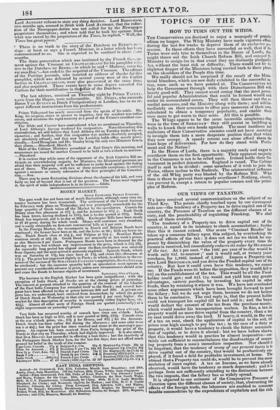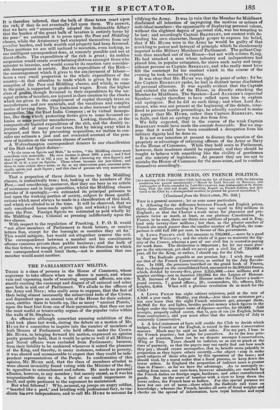OUR VIEWS OF TAXATION.
WE have received several communications on the subject of our Third Key. The points chiefly touched upon by our correspond. ents are—the tendency of a Property-tax to drive capital out of the country, the Pressure of Taxation on the different classes of so- ciety, and the ,practicability of regulating Franking. We shall speak of them seriatim.
The tendency of a Property-tax to drive capital out of the country, is equal to its tendency to check accumulation; further than this it cannot extend. Our acute "Constant Reader" has
taken up a common fallacy upon this subject, by overlooking the practical effects of the tax : it does not act (as we think he sup- poses) by. diminishing the value of the property every time the income is received, but immediately reduces its value by the amount of the tax. At 5 per cent. "the 100/. per year of to-day would be worth only 95/. to-morrow ;" and it would sell, at twenty years' purchase, for 1,900/. instead of 2,000/. Impose a Property-tax, says Lord BROUGHAM, and you drive the Funded capital out of the country. But how it could even have this tendency, we cannot see. If the Funds were 85 before the imposition, they would fall to 80 on the establishment of the tax. This would be all the Fund- holder could get ; and 81/. 158. would not yield him any greater advantages, cceteris paribus, by investing his capital in other funds, than by retaining it where it was. We have not overlooked some other arguments which have been brought forward to meet the fallacy; but we do not urge them, because we do not believ,e them to be conclusive. The real reply is, that the present holder could not transport his capital till he had sold it; and the buyer would deduct the amount of the tax from the purchase-money; which would render his transportation useless. In fine, a tax on property would no more drive capital from the country, than a tax on rent could drive away the land. If heavy, it would, in the case of a tax on rent, check the application of capital to the soil, till prices rose high enough to pay the tax ; in the case of a duty on property, it would have a tendency to check the future accumula- tion of capital, or to drive it abroad : but we have before shown, that this tendency would in practice be almost inoperative—cer- tainly not sufficient to counterbalance the disadvantage of remov- ing property from a man's immediate inspection. Nor should it be forgotten, that the tendency of many of our present taxes is to drive capital out of the country, that would be productively em ployed, if it found a field for profitable investment, at home. The utmost that a Property-tax could do, would be to prevent the am- ' mulation of inert capital. A tax on Income, as we have already observed, would have the tendency so much deprecated; and it is perhaps from not sufficiently attending to the distinction between the two imposts, that the fallacy has so widely spread. It is objected to our estimate of the Comparative Pressure of Taxation upon the different classes of society, that, abstracting the effects of the foreign trade, the labourers are enabled to consume taxable commodities by the expenditure of capitalists awl the rich. It is therefore inferred, that the bulk of these taxes react upon the rich; if, they do not eventually fall upon them. We answer, that we have not "unreservedly adopted the fashionable fallacy that the burden of the great bulk of taxation is entirely borne by the poor:" we estimated it to press upon the Poor and Middling classes, while the Aristocracy had exempted themselves from any ywattiar burden, and both wealth and property had been favoured. Those positions we are still inclined to maintain, even looking, as our intelligent correspondent does, at remotely possible and not at direct effects. The expenditure of the rich is great ; its sudden suspension would create overwhelming distress amongst those who minister to luxuries, and would cause by its reaction very consider- able derangement in society. But the expenditure of the Rich— the encouragement which it gives to the employment of labour— bears a very small proportion to the whole expenditure of the country—to that stimulus to trade which is given by the con- sumption of the Poor and Middling classes, and which, to come to the point, is supported by profits and wages. Even the higher class of profits, though favoured in their expenditure by the un- equal system of taxation, are injured in their creation by the checks which are given to the employment of capital through taxes on manufactures and raw materials, and the vexatious and complex modes of levying them. This limitation is also increased by actual monopolies, like the East India Company ; or by virtual monopo- lies, like thoSe which protecting duties give to some favoured co- lonies or some peculiar manufactures. Looking, therefore, at the comparatively limited expenditure of the rich, and the doubly in- jurious effect of many of our taxes, first by taking away what is acquired, and then by preventing acquisition, we incline to con- sider our estimate a just and not overrated account of the pres- sure of taxation on the various classes of society. A Wolverhampton correspondent demurs to our classification of the Malt and Spirit duties- " To the taxes on Spirits and Malt," be writes, "the Middling classes must contribute very materially. My own income is about 2001. a year ; and I find that I expend from 71. to 101. a year in Malt (brewing my own liquor), and about 2/. to 4/. a year on Spirits. Those whose incomes are just below, and those to some extent above mine, as far as my observation goes, consume prin- cipally spirits and malt liquor ; and this class of persons are very numerous in this country." That a proportion of these duties is borne by the Middling classes, is undoubtedly true; but, looking at the numbers of the Poor,—and considering, moreover, that they use beer as an article of sustenance and in large quantities, whilst the Middling classes partake of it sparingly,—we estimated its principal pressure to rest upon the working portion of society, subject to those qualifi- cations which must always be made in a classification of this kind, and which we alluded to at the time. It will be observed, that we only considered home-made spirits (gin and whisky) as falling upon the Poor. Foreign Spirits we estimated as paid wholly by the Middling class; Colonial as pressing indifferently upon the two classes.
With respect to the regulation of Franking, I. P. 0. B. would "not allow members of Parliament to frank letters, or receive letters free, except for the boroughs or counties they sit for." This would mitigate, but would not altogether remove the evil. The correspondence between a member and his constituents oftener concerns private than public business ; and the bulk of the free letters, we imagine, at present take the direction to which our correspondent would limit them,—not to mention that one member would assist another.



















 Previous page
Previous page